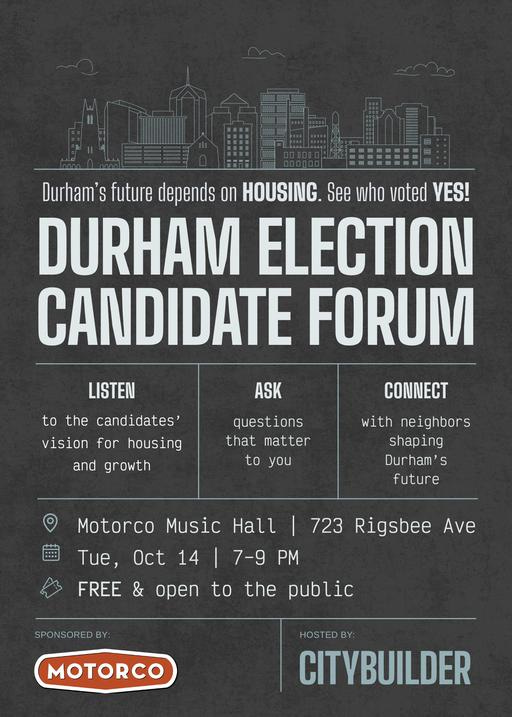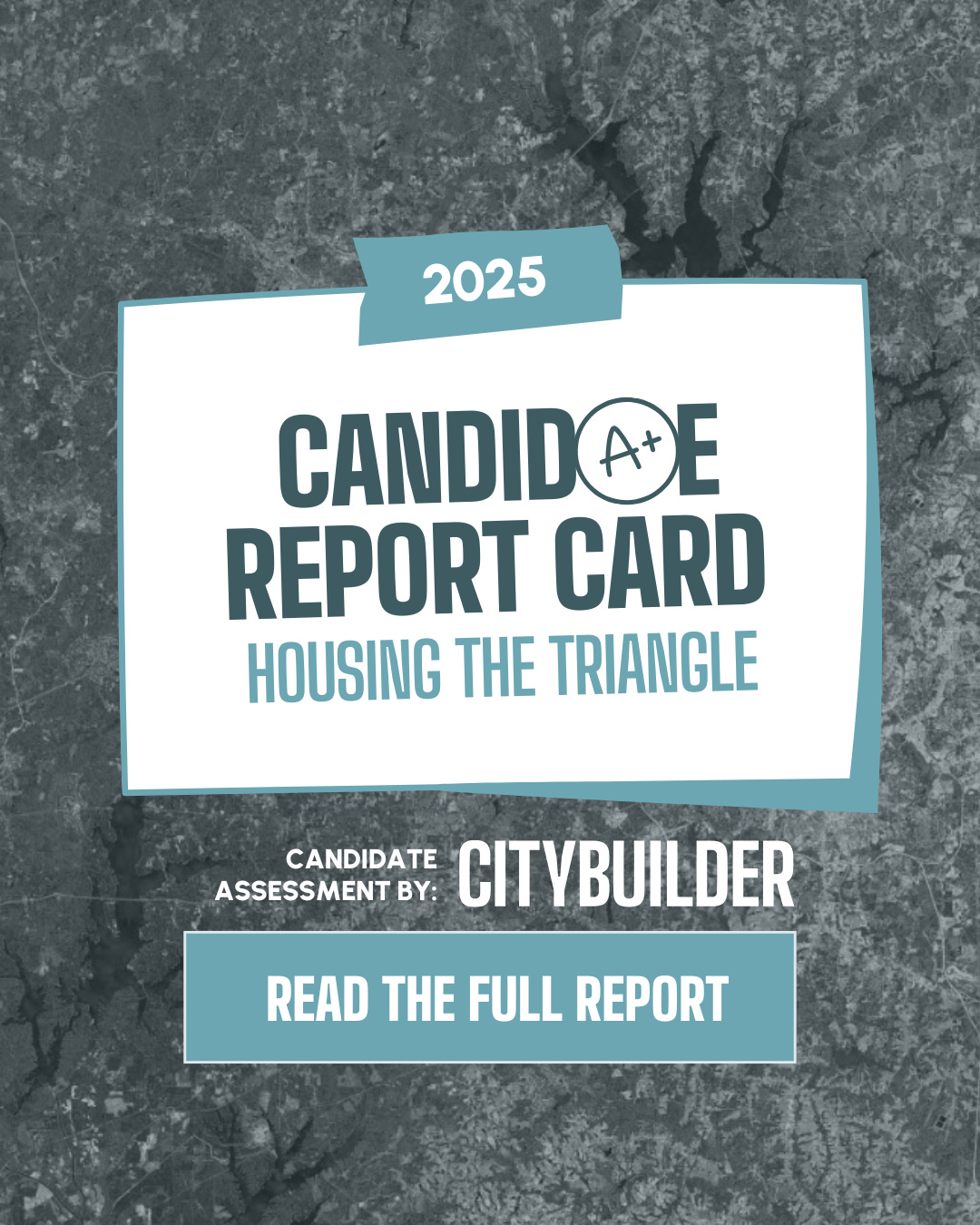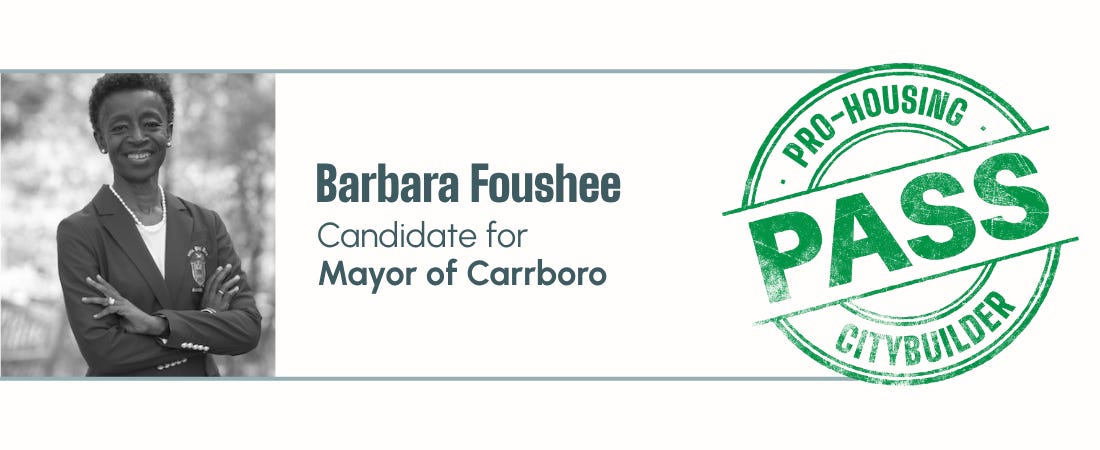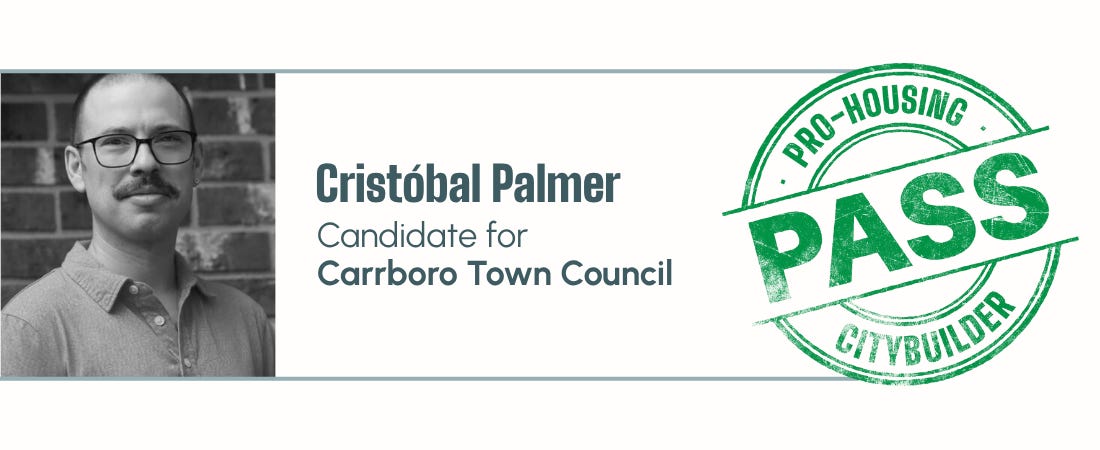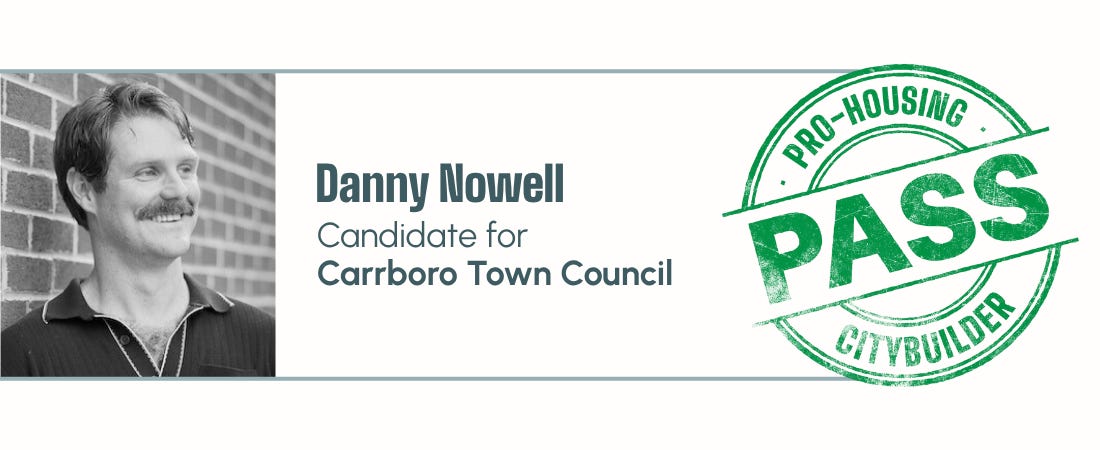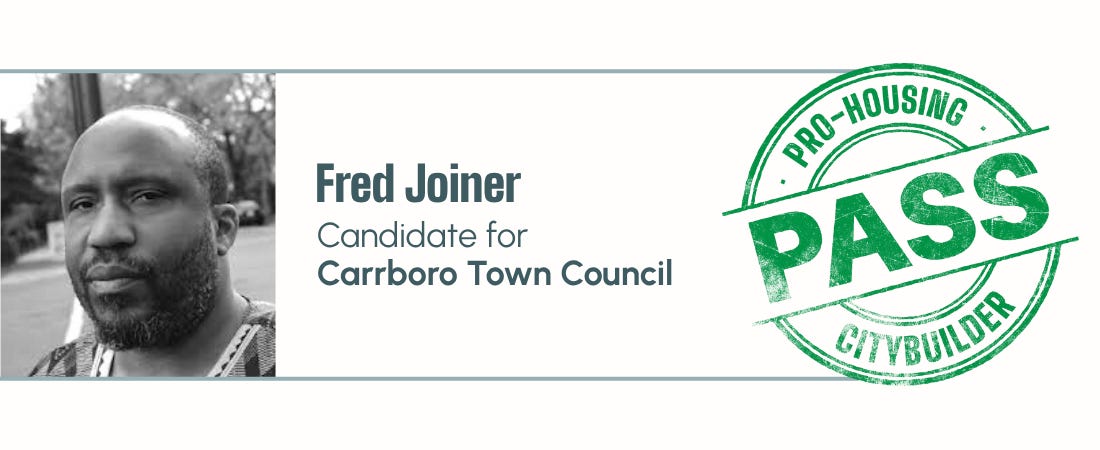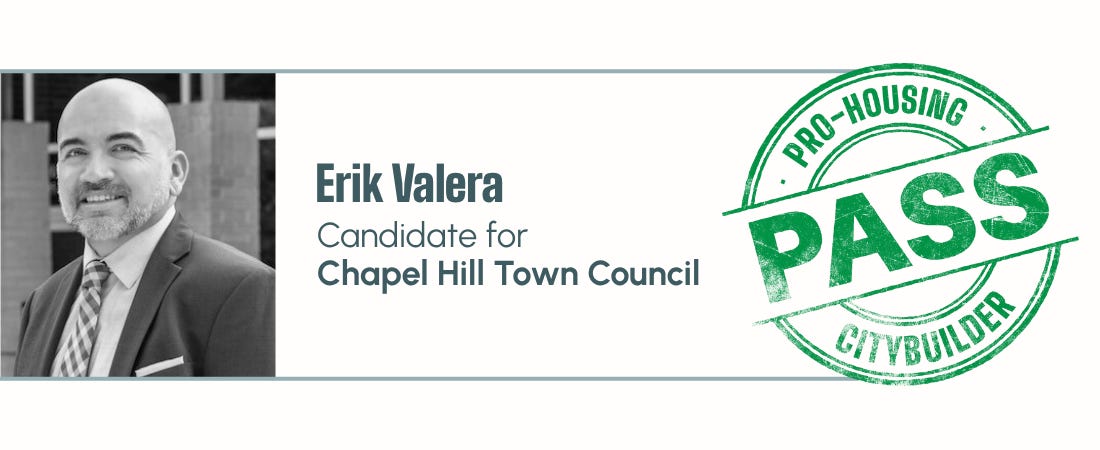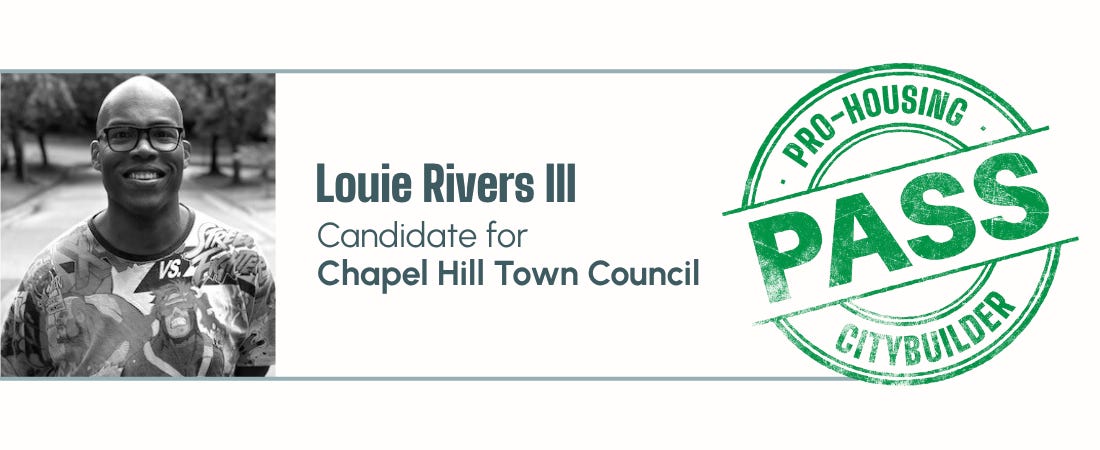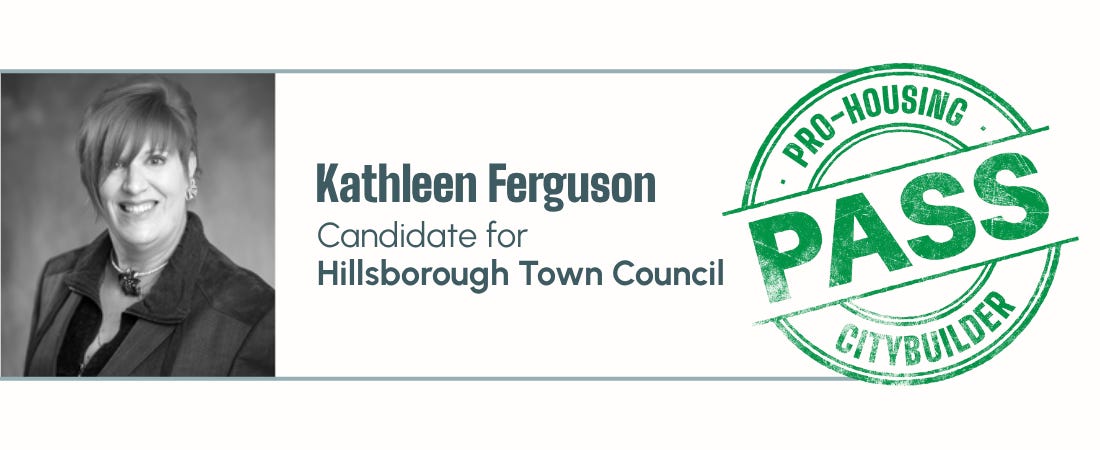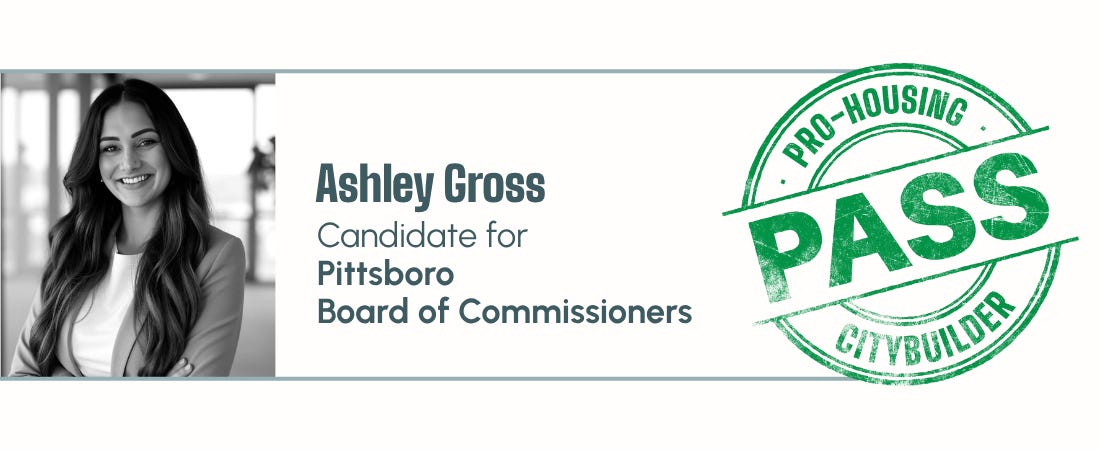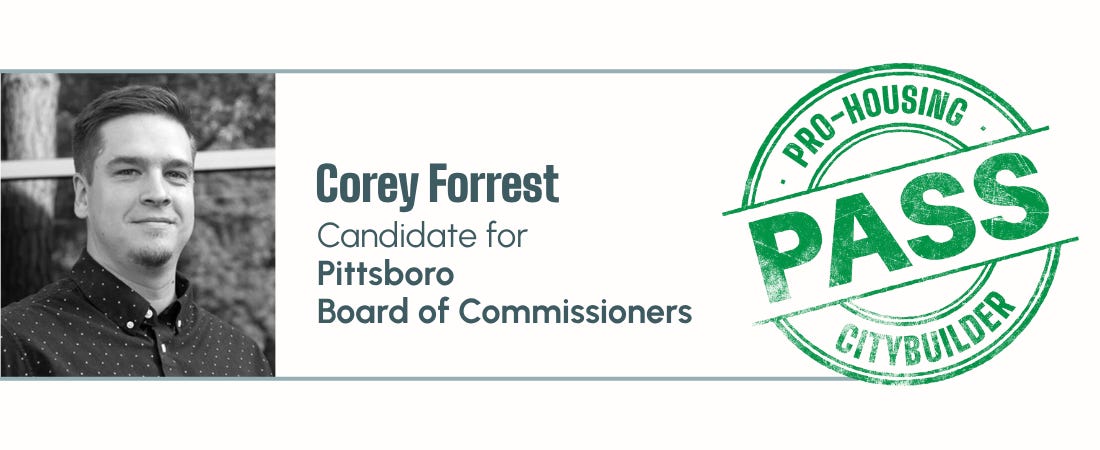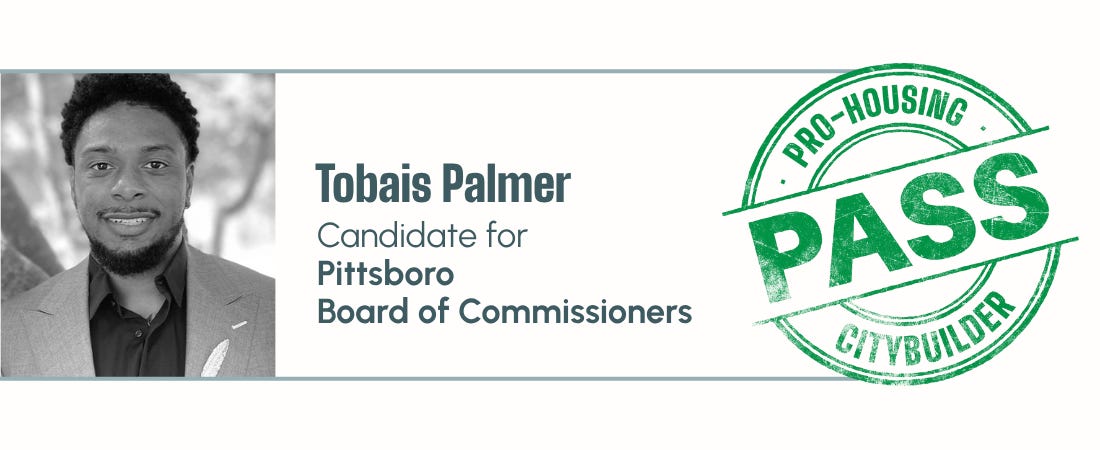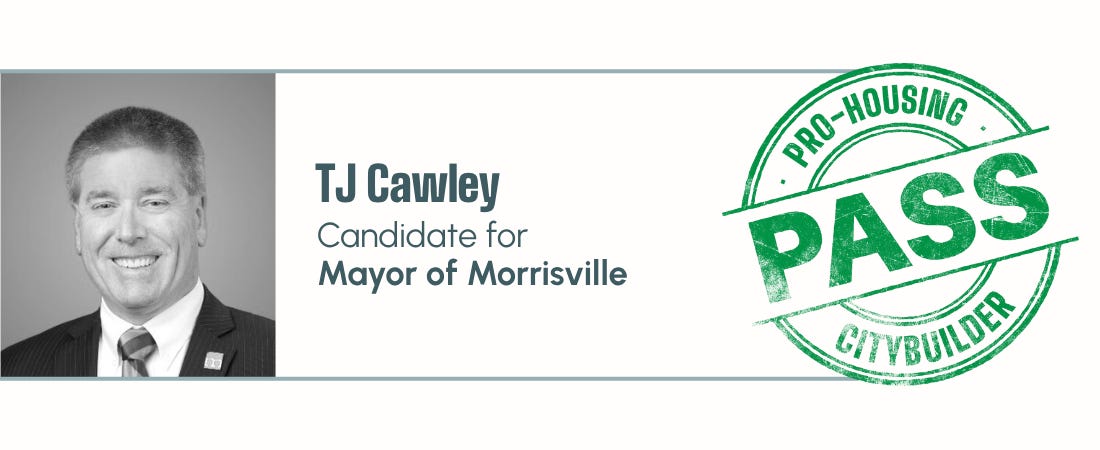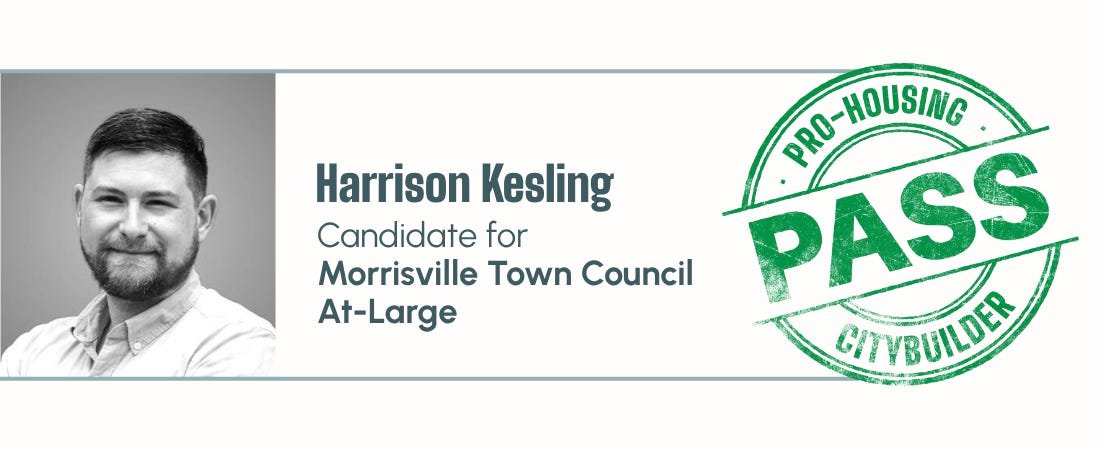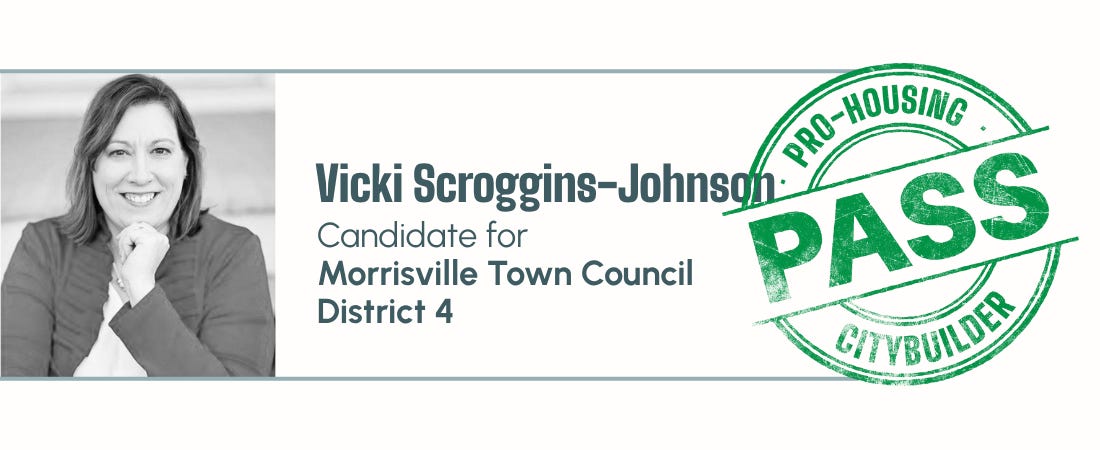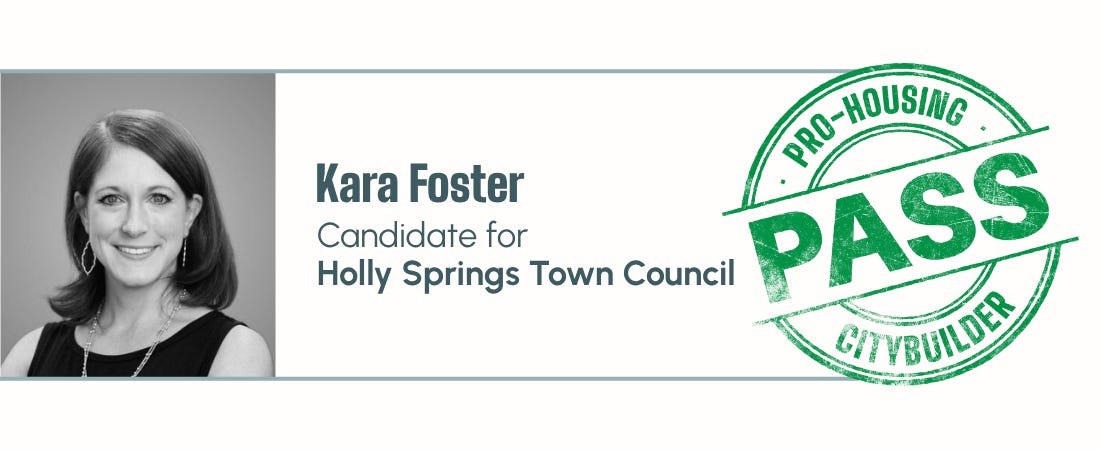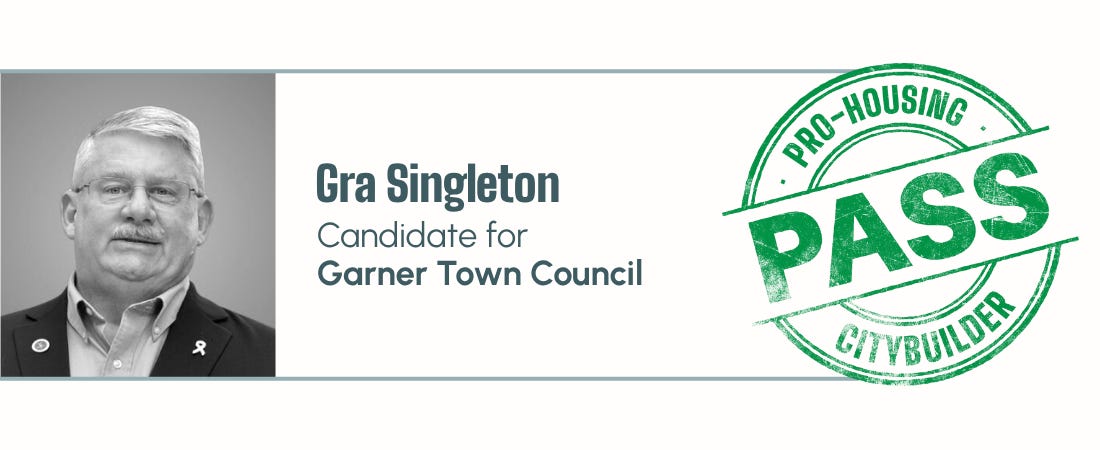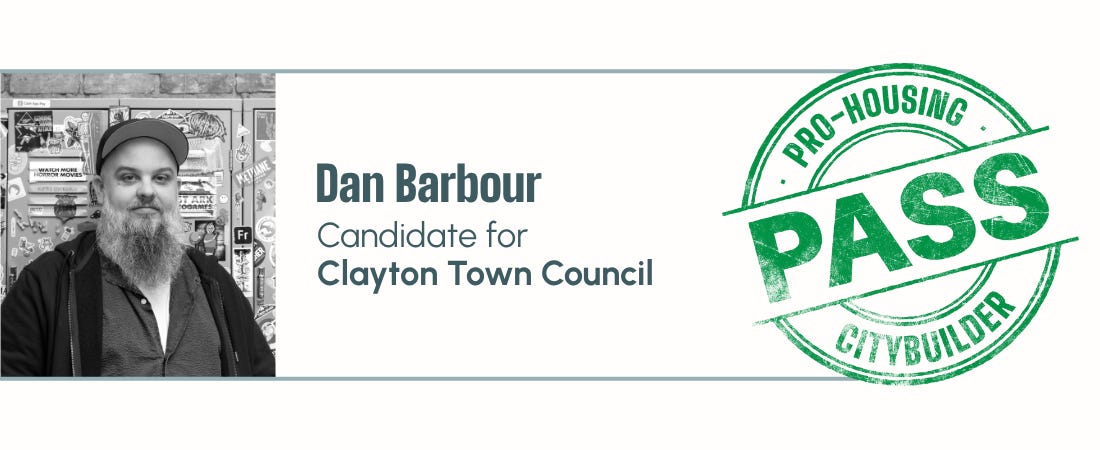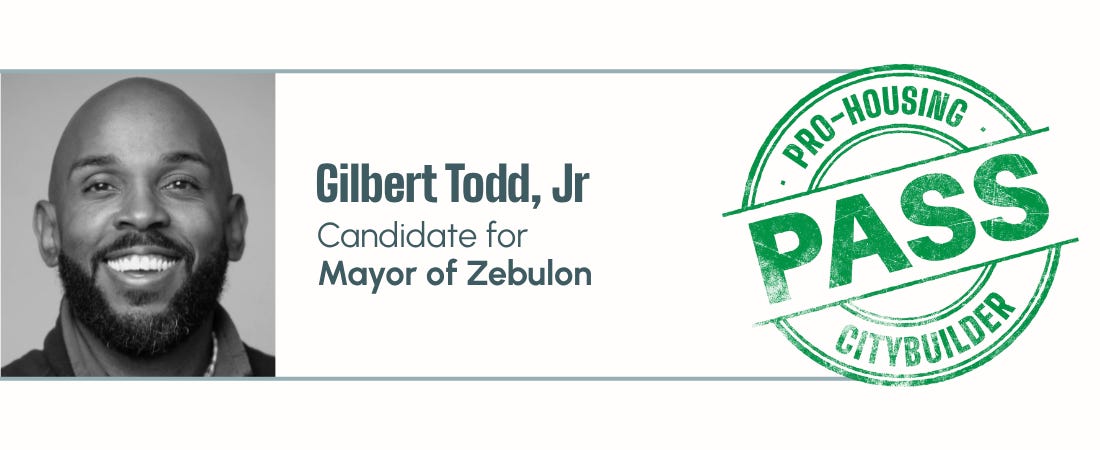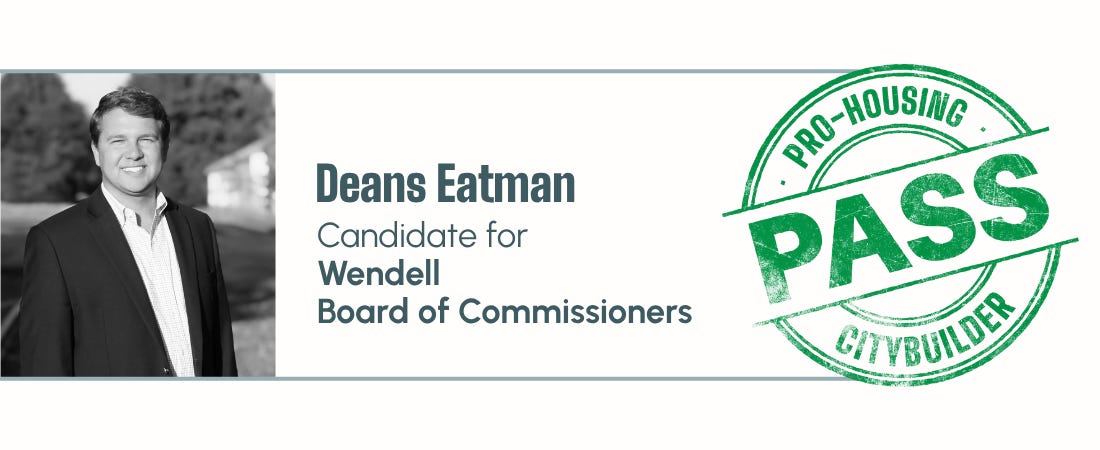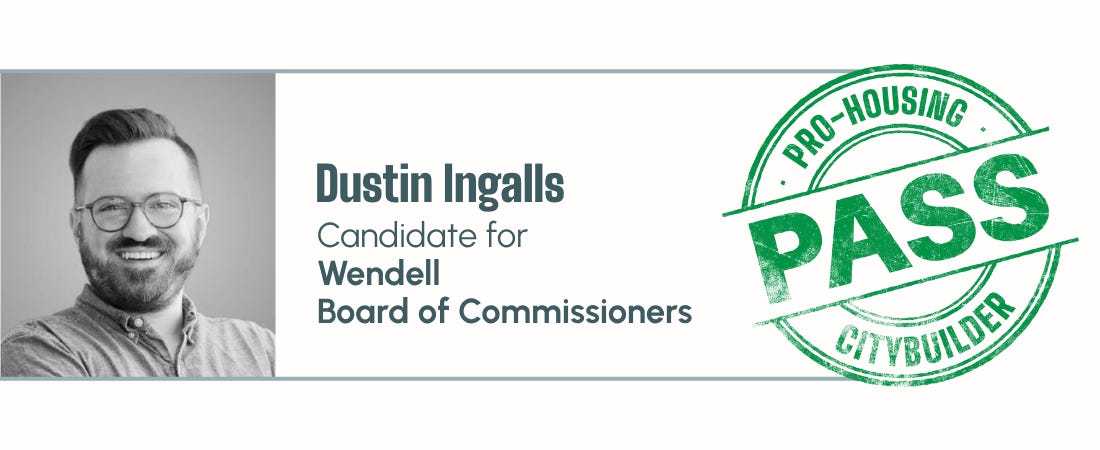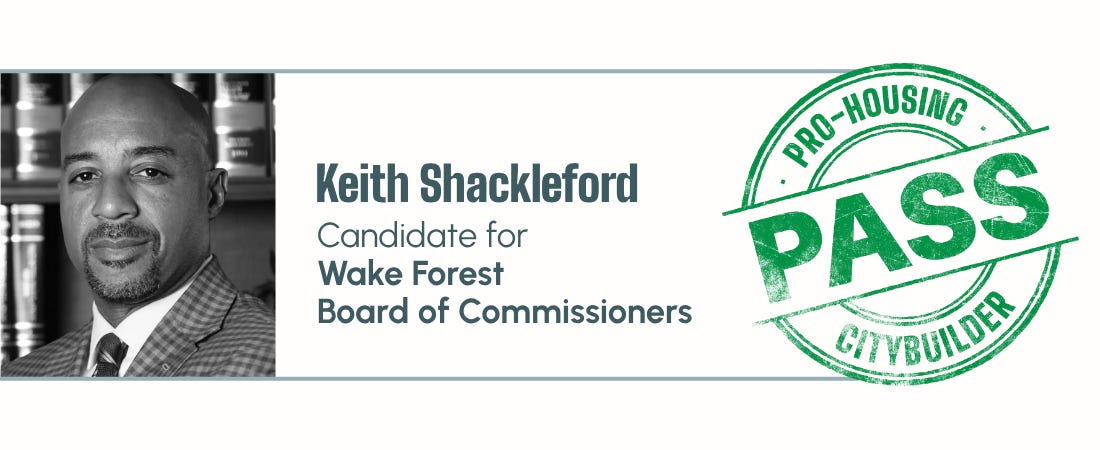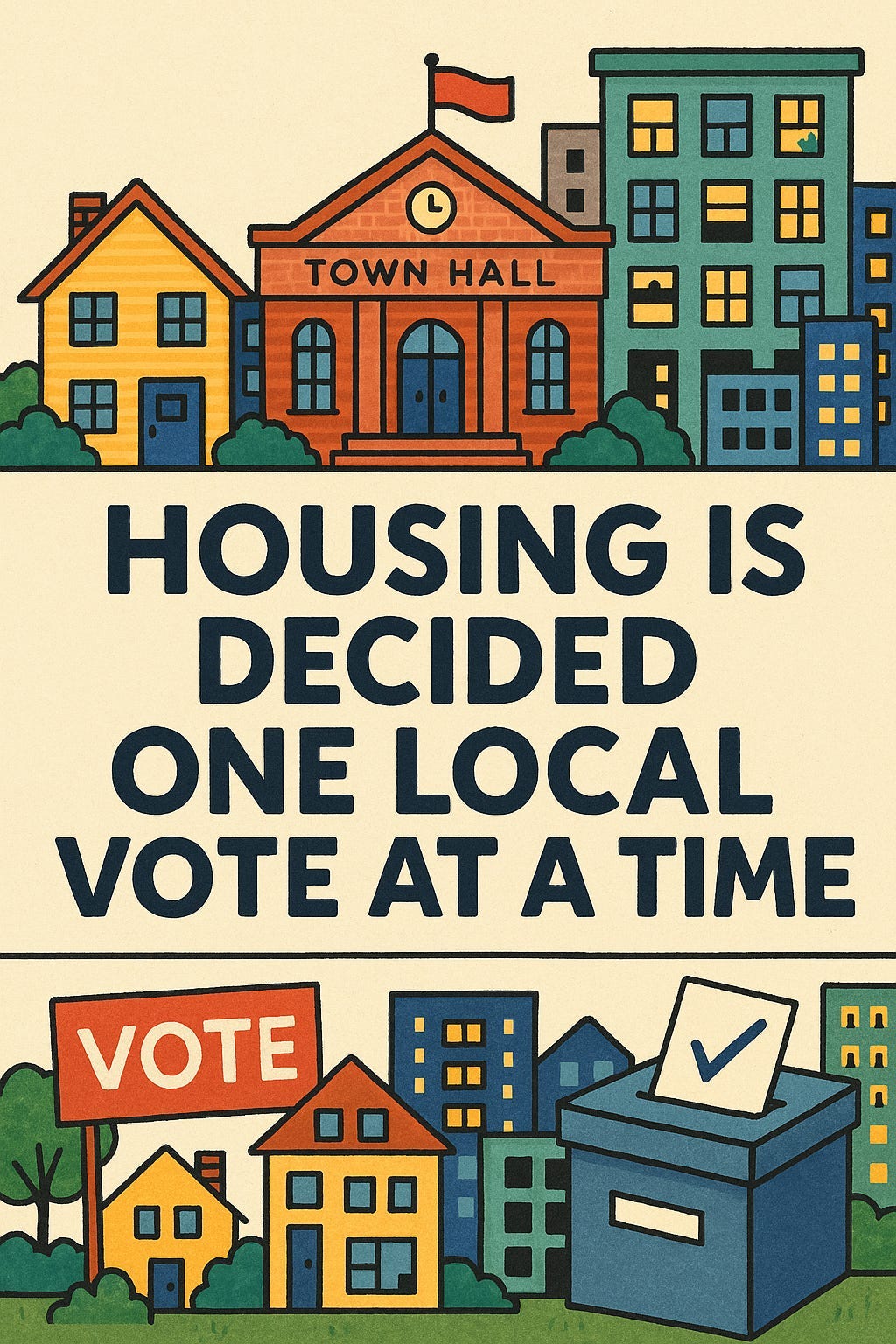2025 Local Election Guide: Who Passes the Housing Test?
We graded Triangle candidates on housing, growth, and the future of our towns and cities
It’s municipal election season in the Triangle, which means voters (like you!) across dozens of towns and cities are about to choose the local leaders who shape how and where we live. From Durham and Chapel Hill to Apex, Garner, Pittsboro, and more — every community’s decisions add up to the region we become.
Municipal leaders shape housing every time they vote on rezonings, update development rules, or decide where new homes can be built. While Congress gets more attention, it’s your city councils, town boards, and county commissions that determine whether we build inward with walkable neighborhoods or outward with sprawl.
That’s why CITYBUILDER created the Triangle Housing Candidate Report Cards.
Working with RDU New Liberals, Yes! in My Triangle YIMBYaction chapter, and Strong Towns Raleigh Local Conversation, we collaboratively graded candidates on their approach to housing, growth, and community resilience.
The Triangle is a growing region, and that growth brings pressure to both big cities and small towns. Every day, hundreds of people move here or grow up here hoping to find a place to call home. Our region faces a shortage of several hundred thousand homes, and that shortage touches everyone, from young families and longtime residents to teachers, nurses, and service workers who keep our cities running.
We need leaders who see housing as a shared responsibility and who believe every neighborhood should have room for the people who make it thrive. Meeting this demand means supporting both publicly funded affordable housing and privately built market-rate homes. We looked for candidates who understand existing policies, support best practices in zoning reform, and recognize that strong neighborhoods and resilient local economies depend on welcoming new neighbors.
These are the leaders who pass the test. They understand that abundance, affordability, and neighborhood strength go hand in hand.
As Election Day approaches, it’s a moment to remember what local democracy really means. These decisions about housing and growth aren’t abstract, they shape our daily lives. Taking part locally is how we practice democracy at its most meaningful scale. Read the guide, look up where to vote, and make a plan to show up. Because when more of us participate, our cities become more open, stable, and fair. Every vote builds a city.
Your Next Steps:
📖 Read our voter guides below. See where your local candidates stand on housing.
🗳️ Make a plan to vote. Look up where and when to vote, mark your calendar, and show up.
And bonus points: if you’ve got extra time or energy, help the candidates who share your values. They need volunteers this month to make phone calls, send texts, knock on doors, and stand at the polls. Even a few hours can make a difference and they will absolutely appreciate you making the time.
Key Election Dates for 2025
Municipal Election Early Voting:
Thursday, October 16th - Saturday, November 1st
Municipal Election Day:
Tuesday, November 4th
Click on a municipality to see how its candidates responded:
Carrboro Chapel Hill Clayton Durham Garner Hillsborough Holly Springs Morrisville Pittsboro Wake Forest Wendell Zebulon
Durham
Updates: After the Primary
Durham’s primary results are in, setting the stage for the general election and signaling how voters view their growing city and the leaders shaping it.
Primary Results: Leonardo Williams (55%) and Anjanée Bell (30%).
You’ll see these two face-off in the general election for Mayor.
Primary Results: Matt Kopac (41%) and DeDreana Freeman (39%)
You’ll see these two face-off in the general election for Ward I.
Primary Results: Shanetta Burris (49%) and Mark-Anthony Middleton (40%)
You’ll see these two face-off in the general election for Ward II.
Primary Results: Chelsea Cook (60%) and Diana Medoff (25%)
You’ll see these two face-off in the general election for Ward III.
Per Axios initial reporting, where they point out that the results f Durham’s elections will be a signal for “how voters view their growing city and the leaders shaping it”. CITYBUILDER previously released housing report cards for all Durham candidates, evaluating their understanding of local housing policy and their approach to building a more inclusive and resilient Durham.
Candidate Forum focused on Housing
With the field now narrowed, we’re keeping the conversation going through our upcoming Durham Election Candidate Forum, focused on Housing Tuesday, October 14, where voters can hear directly from the candidates. Come out to hear what candidates have to say about all things housing in Durham, and have a chance to ask your questions as well.
Join us for a Durham Election Candidate Forum!
Tuesday October 14
7PM - 9PM
Motorco Music Hall
723 Rigsbee Ave, Durham
We will have free childcare on site, as well as snacks.
Beverages are for purchase.
There are many reasons to vote for city councilors, but CITYBUILDER’s forum focuses on one of the most pressing issues in Durham today: how we build enough homes for everyone who wants to live here. The Durham Election Candidate Forum on Housing will bring neighbors, builders, and voters together to discuss what’s next for our city and to hear directly from candidates about how they plan to make housing more abundant, walkable, and fair. Bring your questions, your curiosity, and your care for Durham’s future.
Our Pro-Housing Picks Across the Triangle
Across the Triangle, towns from Chapel Hill to Garner, Apex to Pittsboro are shaping what our region will become. Each community’s choices influence the whole, and this election season is a chance to work together toward a more welcoming, connected future.
CITYBUILDER looked across the region to recognize the many kinds of pro-housing leadership emerging here. Our report cards highlight the candidates who passed the pro-housing test, leaders ready to welcome growth, support small businesses, and help every town and city do its part to build a stronger and more inclusive Triangle.
Carrboro
Barbara Foushee (incumbent), when asked if is there a housing shortage, answered “Yes, from an access and affordability standpoint. The demand is clearly outpacing the available supply of both for sale and rental units, especially at accessible and reasonable price points. The limited new construction, lack of diverse housing stock and rising prices reflect a structural mismatch between who wants to live in Carrboro and what housing is available to them across socio-economic statuses.”
Cristobal Palmer (incumbent): “…given the extensive feedback we’ve gotten from our community engagement process, I’m optimistic about the town’s enthusiasm for adding significantly to our housing stock while simultaneously adding public green space and other quality of life improvements.”
Danny Nowell (incumbent): “We’ll be finalizing our newly revised Land Use Ordinance, which will strongly prioritize more efficient building of multifamily housing, more diverse types of single-family housing, and strongly incentivize more affordable units through efficiencies and expedited review practices.”
Fred Joiner, when asked what type of housing the community needs, answered “I think more middle income and workforce housing so that the people that serve can afford to live where they serve.”
Joe H. Lloyd, Jr. did not respond to our questionnaire.
Want to see the candidate’s answers in full?
We’ve added the complete set of responses here.
Chapel Hill
Erik Valera: “Chapel Hill needs more homes of all kinds—especially those that meet the needs of people across income levels, ages, and stages of life.. Growth should follow a Complete Communities approach—prioritizing compact, walkable neighborhoods that are connected to transit, jobs, and green spaces—so everyone feels welcomed and has a fair opportunity to live, work, and play in Chapel Hill.”
Louie Rivers III: “We need to rewrite our LUMO to reflect that values and housing needs of Chapel Hill in 2025.. we need more types of housing and development across the board. We need dense apartment buildings and mixed use developments along our transit corridors. We also need greater housing options in our existing neighborhoods, specifically the leeway to build duplexes, and triplexes in areas that have traditionally been zoned for single family residences where appropriate.”
Camille Berry (incumbent), Paris Miller-Foushee (incumbent), Jon Mitchell, and Wes McMahon did not respond to our questionnaire.
Want to see the candidate’s answers in full?
We’ve added the complete set of responses here.
Hillsborough
Kathleen Ferguson (incumbent): “We need more affordable housing in the 0 - 150% AMI price points. Density is the most cost-effective service delivery condition; however, density requires residents to willingly support and live in multi-story rental and ownership residential properties. Our current ordinances and what I anticipate will be our future ordinances will continue to incentivize density. We already support ADUs by right in all residential zones, and we already have full board support, including me, for increasing missing middle duplexes, triplexes, quads, as well as incentivizing vertical mixed use commercial/residential.”
Robb English (incumbent) did not respond to our questionnaire.
Want to see the candidate’s answers in full?
We’ve added the complete set of responses here.
Pittsboro
Ashley Gross: “Chatham County urgently needs more workforce housing. Homes affordable to families earning $60,000–$120,000 annually, including teachers, first responders, and healthcare workers. Right now, market conditions are pushing these essential workers out of the communities they serve. The priorities should include: Townhomes and small-lot single-family homes in the $250,000–$400,000 range; Quality apartments and condos for young professionals and seniors; Accessory dwelling units to add gentle density in existing neighborhoods. Growth should be concentrated where infrastructure can support it, around Pittsboro and along major transportation corridors. We also need to leverage proximity to Research Triangle jobs while ensuring new development contributes its fair share to infrastructure costs.”
Corey Forrest: “Density, density, density! I’ve heard it over and over again and I think it’s absolutely right, there’s just no way around it. We need more affordable options whether that be townhomes or apartments and we need them where people are working. We need density in and around our downtown areas.”
Tobais Palmer: “Pittsboro has had issues over the years with infrastructure especially supplying access to wastewater or sanitary sewer. Without sanitary sewer communities cannot create infill and density by going vertical which are two strategies that can address housing demand. Pittsboro, Chatham County and Siler City have merged with Tri-River Utilities to create a unified utility district in Chatham and Lee County. This will allow more housing and potentially mixed use communities to be developed.”
Nikkolas Shrame and Tiana Thurber responded to our questionnaire, but didn’t meet our qualifications for a pro-housing candidate.
Candace Hunziker, Alex M. Brinker, and Freda Alston did not respond to our questionnaire.
Want to see the candidate’s answers in full?
We’ve added the complete set of responses here.
Morrisville
TJ Cawley (incumbent): “All communities in Wake County are facing a housing shortage. With 65 new residents being added every day, Morrisville is running out of developable land. While we are actively working to provide housing to meet this demand, it’s clear that supply is insufficient to keep pace with growth. My perspective aligns with both CITYBUILDER’s belief that everyone deserves housing choices and Yes! In My Triangle’s focus on expanding housing supply to meet demand.”
Satish Garimella responded but didn’t meet our qualifications for a pro-housing candidate, you can read full answers here.
Richard Reinhart did not respond to our questionnaire.
Harrison Kesling: “We need development that meets the needs of working families and protects our environment. We need to limit sprawl by prioritizing pedestrian oriented, mixed use, mixed-income development along transit corridors. Having to drive from sprawling suburbs to our places of employment, education, and community building degrades our environment, our health, and our well-being. Additionally, prioritizing car centric development means less land overall for housing which has contributed to our housing shortage.”
Liz Dann, Pete Martin, and Subba Reddy Madireddy did not respond to our questionnaire.
Vicki Scroggins-Johnson (incumbent) “Morrisville has a Unified Development Ordinance which is the town’s playbook for its physical future - balancing growth, aesthetics, and livability. Most large land parcels are developed, so infill has become increasingly important.”
Patty Wei-Pei Cheng responded but didn’t meet our qualifications for a pro-housing candidate, you can read full answers here.
Want to see the candidate’s answers in full?
We’ve added the complete set of responses here.
Holly Springs
Kara Foster: “If elected, I would support updating zoning to allow a wider variety of housing types, townhomes, duplexes, accessory dwelling units, and mixed-use developments, especially near schools, jobs, and transit. I would also advocate for reducing outdated parking minimums, which increase housing costs without always reflecting real demand.”
Annie Drees (incumbent), Tim Forrest (incumbent), Joe Cuccurullo, Josh Prizer, and Sarah Larson did not respond to our questionnaire.
Want to see the candidate’s answers in full?
We’ve added the complete set of responses here.
Garner
Gra Singleton (incumbent), when asked what policies could change to build more housing, answered “Some possible changes to the UDO may include considering eliminating the SUP process as it takes time and may add to the uncertainty of a project, increase opportunities for density, improve the permitting process to save developer some time, and possibly expedite review and permitting for affordable housing projects that meet the Town’s goals.”
Kathy Behringer (incumbent), Rex Whaley, Mike McIver, Patricia T. Uzzell, and Kelvin Stallings did not respond to our questionnaire.
Want to see the candidate’s answers in full?
We’ve added the complete set of responses here.
Clayton
Dan Barbour, when asked if there is a housing shortage, answered “Yes, especially when it comes to affordable housing and non-apartment options for young adults and families. We’ve seen a lot of growth, but most of it has been large subdivisions or high-rent apartment complexes. There is a real gap in what is often called “missing middle” housing, like townhomes, duplexes, and smaller single-family homes. These could offer more attainable options for people who want to live and work here but can’t afford what is currently being built.”
Andria Archer (incumbent), Porter Casey, Jr. (incumbent), Keith Branch, Jason E. Carter, Amanda Underwood and did not respond to our questionnaire.
Want to see the candidate’s answers in full?
We’ve added the complete set of responses here.
Zebulon
Gilbert Todd, Jr. “Zebulon needs more mixed-use development, particularly residential-over-retail projects. This type of development creates vibrant, walkable neighborhoods where residents can live, shop, and dine, which strengthens our local economy and builds a stronger sense of community.”
Want to see the candidate’s answers in full?
We’ve added the complete set of responses here.
Wendell
Deans Eatman (incumbent): “I believe we have a responsibility to guide growth in a way that expands housing choices, keeps our town accessible, and supports long-term affordability. That includes allowing more types of housing, especially in areas with infrastructure in place. Wendell won’t solve the Triangle’s housing challenges alone, but we can and should do our part.”
Dustin Ingalls: “In downtown, I want to encourage infill and activation of second floors, some of which could potentially be used as apartments. But most development is and will continue to be on land that has never been developed, and I want to be smart about using it well… I want to reduce car trips on major roads by putting housing as close to new and existing commerce, jobs, and recreation as possible, including multiuse development. We must continue building out our multiuse path connecting Wendell Falls to downtown, as well as our greenway system and sidewalks.”
Wes Jones, B.J. Barham, Kate Benson, Dustin Ingalls, Jorge Cordova, Philip Tarnaski, and Christopher M. Critzer did not respond to our questionnaire.
Want to see the candidate’s answers in full?
We’ve added the complete set of responses here.
Wake Forest
R. Keith Shackleford (incumbent), when asked if there is a housing shortage, answered “Yes. Our community has a shortage of affordable housing.. We need more affordable housing. The definition of affordable is different depending upon whom you are speaking with. We need housing that is affordable for young families and our workforce.”
Nick Sliwinski (incumbent), Jasmine Zavala, Haseeb Fatmi, Thomas Dement, and Pam James Ben Clapsaddle did not respond to our questionnaire.
Want to see the candidate’s answers in full?
We’ve added the complete set of responses here.
Thanks for reading and for showing up for housing this election season.



